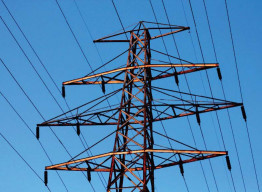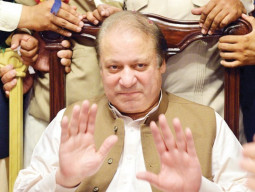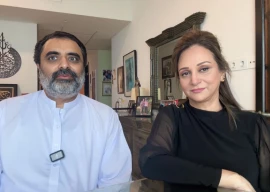
ISLAMABAD:
The government is planning to recover about Rs120 billion in the first phase under the tariff rationalisation plan by increasing electricity prices for consumers belonging to the bulk category which includes big housing societies, industrial and commercial consumers.
The increase in electricity tariffs for domestic consumers will be announced in September.
The energy committee of the cabinet that met on Monday discussed at length the various proposals that Prime Minister Nawaz Sharif will announce as part of his energy policy. The committee, conceptually, cleared the proposal to increase tariffs for the bulk category from this month, according to the officials who attended the meeting.
Headed by the Finance Minister Ishaq Dar, the meeting was attended by the Planning and Development Minister Ahsan Iqbal, Special Assistant to the Prime Minister Dr Musadaq Malik and Economic Reforms Unit Director General Dr Najeeb Khaqan. Former finance minister Shaukat Tarin was also among the participants.
But the final approval will be given by the premier in the next meeting of the committee. According to the discussions, the government was planning to bring down subsidies for the industrial consumers close to zero in the first phase of the plan and phase out subsidies for the bulk and commercial consumers in a period of three years.
The government will collect additional Rs7 billion a month or Rs84 billion yearly from industrial consumers and Rs30-36 billion annually by increasing tariffs for commercial and bulk consumers, according to estimates. Big housing societies like Model Town in Lahore and various industries purchase electricity in bulk.
The end-consumer on average pays Rs8.81 per unit of electricity consumed, while the average cost of generating that same unit is Rs14.4. The difference is borne by the government in the shape of subsidies. For the current fiscal year keeping in the view the electricity unit consumers, subsidies will cost the treasury Rs470 billion.
On the flipside, the government had budgeted Rs220 billion to pay subsidies, while the significant portion of the remaining Rs250 billion will be recovered from the consumers by increasing tariffs, cutting back line losses and improving management of the state-owned generation companies.
A senior official of the finance ministry said that it had been agreed with the International Monetary Fund (IMF) that power subsidies will not be eliminated, but will be reduced to sustainable levels. After completion of the three-year energy sector reform programme, power subsidies will be reduced to just 0.4% of the gross domestic product (GDP), he added.
The prime minister will announce the plan to reduce line losses and improve management in the energy policy.
Power tariff hike and finalisation of a new energy policy was one of the five pre-conditions that the IMF set before approving the bailout package of at least $5.3 billion when the IMF executive board meets in the first week of September.
The Washington-based fund and Pakistan failed to reach an agreement on what should be the level of quota for lifeline consumers as the government wanted the quota to be 300 units a month, while the IMF insisted to retain it at the current level of 50 units, the official said. The threshold will be worked out soon but it will not be 300 units a month, he added.
While talking to The Express Tribune, Special Assistant to the Prime Minister Malik said that in the energy committee’s view, cross subsidies should be retained in the energy policy.
The industrial consumers should pay part of domestic consumers’ power bills.
“The idea was that those who were using electricity for making big fortunes should pay for those who cannot afford higher power tariffs.”
To a question regarding the tariff rationalisation model, Malik said the committee was still working on the impact of increase in tariffs on reducing the circular debt, burden on the economy and the extent of increase in power sector revenues.
The meeting was also briefed about reducing load shedding during Ramazan, particularly during Sehr, Iftar and Taraweeh.
Published in The Express Tribune, July 9th, 2013.
Like Business on Facebook, follow @TribuneBiz on Twitter to stay informed and join in the conversation.
COMMENTS (6)
Comments are moderated and generally will be posted if they are on-topic and not abusive.
For more information, please see our Comments FAQ

















































Make the electricity so expensive that people don't use much and don't turn ON the air conditioners therefore reducing energy consumption and eventually resulting in surplus energy. What a solution to the power crisis. One day we will have all the power/electricity but so expensive that most of us will keep the lights and the fans off .... seems like the basic necessities are and will be far from our reach .....
One thing is confirmed,id est,the more electricity rates government will increase the more electricity theft shall raise and increase in Pakistan.... Why Pakistan government is not prepared to accept this harsh reality which Pakistan is facing severely and there are some areas of Pakistan even there people don't pay their electricity bills,some federal and provincial departments are WAPDA's defaulters and billions of Rupees are deferred of the large factories/industries in Pakistan.Why the government doesn't receive this huge amount of money because if the this huge amount of money is received electricity shortfall and load shedding may be overcome easily instead of increasing electricity unit price.....
Rs14.4 is not even the tariff for countries who are producing all their electricity with oil/gas (e.g UAE price is 8.40 PKR/30 fils). Reference : http://www.dewa.gov.ae/tariff/tariffdetails.aspx Sheer amount of Pakistani govt corruption, theft of electricity and corruption of power plants is responsible for such high producing cost.
@Only In Pakistan: Painful for the general public, everything gets more expensive with the onset of Ramadan .... why not increase the electricity tariffs then ...... They can save more money by making the tax collection error and corruption free .... but then the rich and powerful will suffer then .... so they do not ....instead they make everything more expensive .... incompetence of the government imposed on the public.... make all the projects late too so they cost 10 to 100 times more to finish later on ..... and why not complete Iran gas line .... oh because they want to make metro bus system ... Oh well the government is chosen by the people why whine then !!!
You are missing the point ..... You to need control the electricity theft , make sure no one tampers the electric meters and complete the electricity generation projects on time so they dont cost 10 or 100 times more. And there should be equal load sheeding ... why does the goverment officials of high stature do not experience load shedding ? Incompetence of governments being imposed on the already weary people ! Why not shut down the governor houses and such places and save money
A good, necessary, painful step. We can't keep paying electricity below its cost. By bringing the price above the cost we will allow companies to profit and invest in the energy sector and therefore reduce load shedding.